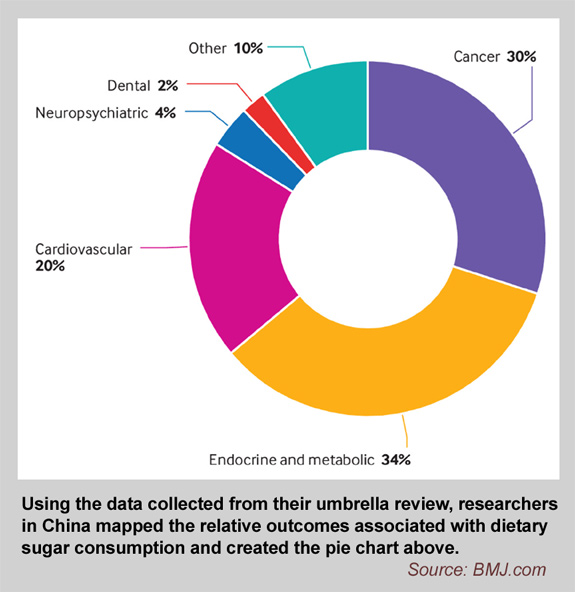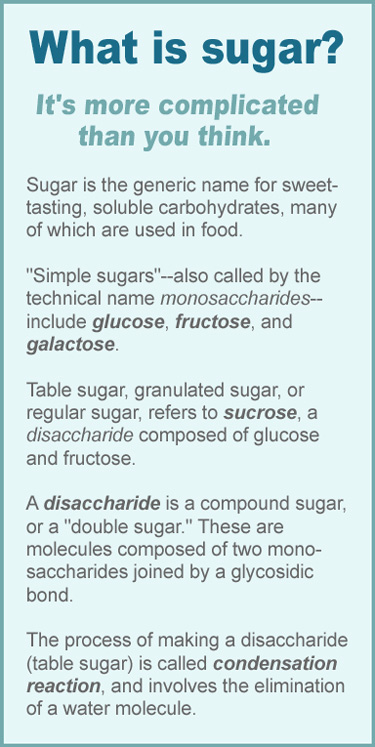Your mother was right when she said consuming too much sugar would rot your teeth; however, according to new research, tooth decay belongs down near the bottom of the list of sugar dangers.
The new study examined 83 health outcomes related to sugar consumption and found that the biggest relative health risks associated with sugar consumption were endocrine and metabolic disorders.
This top risk was followed by cancers, and in third place, cardiovascular conditions.
According to the researchers, dental issues are so far down the list that it even comes in below neuropsychiatric problems. In other words, if you’re consuming added sugar every day, the risk of mental disorders, such as depression, actually pose more danger to your health than tooth decay.
All in all, the study concluded consuming too much added sugar each day raised the risk of developing 45 different health conditions.
The research was conducted at the Department of Oncology, West China Hospital, Sichuan University, Chengdu, China and at the Department of Urologic Surgery, UC Davis School of Medicine, Sacramento, California.
The researchers classified the study as an umbrella review and published their findings in the British Medical Journal in February 2023.
An “umbrella review” examines previous studies on a topic and offer an overall view of all the published information. In this case the investigation included 73 studies from just over 8,600 articles, and covered a total of 83 health outcomes in adults and children.
Study details
To coduct their review, the researchers searched PubMed, Embase, Web of Science, and the Cochrane Database of
Systematic Reviews. The date ranges ran from inception through January 2022, and included systematic reviews and
meta-analyses of randomized controlled trials and observational studies.
Dietary sugar consumption could be measured through the specific proportions of sugars in foods or a percentage of total energy and combined in meta-analyses.
According to the researchers, the available data showed that too much sugar can lead to diabetes, gout, obesity, high blood pressure, heart attack, and stroke.
They also concluded that a sugary diet can increase the odds of developing seven different cancers—including breast, prostate, and pancreatic tumors.
In the neurpsychiatric sphere the researchers found high sugar consumption was associated with an increased risk of attention deficit/hyperactivity disorder in children, and with depression in adults.
Some of the studies the researchers reviewed also established a link to low bone density, gout and asthma.
Perhaps the most daunting finding was that drinking just 250ml (8.5 ounces) per day of sugary drinks was linked to a 17% higher risk of coronary heart disease and a 4% higher risk of death.
Researchers also noted an obvious and already widely-known conclusion: sugar consumption is linked to high body mass index.
High body mass index is tself a risk factor for many diseases.
Six was the magic number
According to the researchers, all the studies combined seemed to point to the critical number of six teaspoons. For most people the body appears to be able to absorb up to six teaspoons daily without too many negative health consequences. However, when a person consumes over six teaspoons many health issues start to crop up.
This number is similar to the recommendations of The World Health Organization, which suggests that added sugars
should not make up more than 10 percent of daily energy intake. There are approximately 16 calories in a teaspoon of
sugar.
If six teaspoons doesn’t sound like much, prepare yourself for a shock: “Added sugar” is any sugar carbohydrate added to food and beverages at some point before their consumption. So, you are likely getting your allotted six teaspoons just
eating your regular meals (since they include plenty of hidden sugars).
This means when you drink a soda pop, or pile teaspoons of sugar into your morning cereal or coffee, you’re already
entering the risk region.
Big challenge
Clearly, the U.S. has a big hurdle to overcome if the conclusions of the researchers are correct. We have a long way to go
to reach the “under six teaspoons” or the “no more than 10% of total calories” goals.
A 2013-2014 government study found that the average U.S. sugar consumption was 125 grams per day for men and 99
grams per day for women.
A teaspoon of sugar by weight is 4.2 grams, so that means men are consuming an average 30 teaspoons of sugar daily
while women consume almost 24. This equates to four or five times more than the recommended six teaspoons the researchers suggested.
In calculating a percentage, we find these number add up to about 25% of the recommended daily calorie consumption coming from sugar—a far cry from the World Health Organization’s recommended 10%.
In short, reaching either of the goals will involve more than just ditching soda pop. It will require ending the addiction to processed foods.
If you want to reduce sugar consumption, lower the effects sugar has on your body, and optimize digestion, Optimal Health Systems is here to help. Learn more by reviewing the products and tools below:
• Optimal Fat•Sugar•Trim
• Flora Blitz 100
• Optimal Digestion
• Weight Reduction Package
• 21-Day Blitz Challenge Package
• Optimal Half-Day Organ Cleanse Kit
– – –
Source: BMJ.com (BMJ 2023;381:e071609s), World Health Organization.



